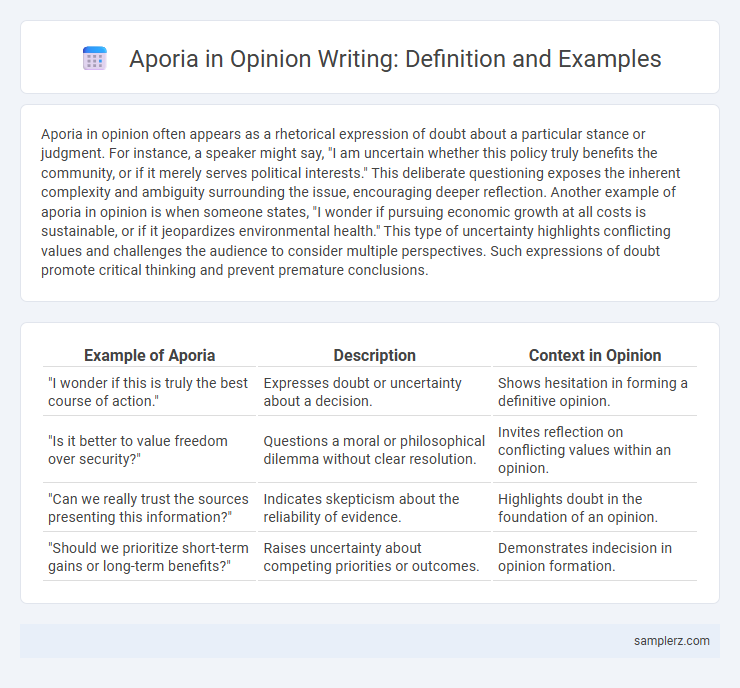Aporia in opinion often appears as a rhetorical expression of doubt about a particular stance or judgment. For instance, a speaker might say, "I am uncertain whether this policy truly benefits the community, or if it merely serves political interests." This deliberate questioning exposes the inherent complexity and ambiguity surrounding the issue, encouraging deeper reflection. Another example of aporia in opinion is when someone states, "I wonder if pursuing economic growth at all costs is sustainable, or if it jeopardizes environmental health." This type of uncertainty highlights conflicting values and challenges the audience to consider multiple perspectives. Such expressions of doubt promote critical thinking and prevent premature conclusions.
Table of Comparison
| Example of Aporia | Description | Context in Opinion |
|---|---|---|
| "I wonder if this is truly the best course of action." | Expresses doubt or uncertainty about a decision. | Shows hesitation in forming a definitive opinion. |
| "Is it better to value freedom over security?" | Questions a moral or philosophical dilemma without clear resolution. | Invites reflection on conflicting values within an opinion. |
| "Can we really trust the sources presenting this information?" | Indicates skepticism about the reliability of evidence. | Highlights doubt in the foundation of an opinion. |
| "Should we prioritize short-term gains or long-term benefits?" | Raises uncertainty about competing priorities or outcomes. | Demonstrates indecision in opinion formation. |
Understanding Aporia in Opinion Writing
Aporia in opinion writing frequently manifests as a deliberate expression of doubt or puzzlement, inviting readers to consider multiple perspectives before arriving at a conclusion. This rhetorical strategy enhances critical engagement by highlighting inherent uncertainties or contradictions within complex issues. Employing aporia encourages a nuanced understanding and fosters deeper reflection on the subject matter's ambiguities.
Classic Examples of Aporia in Editorials
Classic examples of aporia in editorials often manifest as rhetorical questions that express doubt or uncertainty, inviting readers to ponder complex issues. Editorials might question the efficacy of policy decisions or the ethical implications of political actions without providing definitive answers, thereby encouraging critical engagement. This technique enhances persuasive writing by highlighting conflicting viewpoints and the multifaceted nature of public discourse.
Aporia: Enhancing Persuasion through Doubt
Aporia in opinion writing introduces strategic doubt to engage readers by questioning assumptions and revealing uncertainties, thereby enhancing persuasive impact. This rhetorical technique encourages critical thinking, making the audience more receptive to alternative perspectives and deeper analysis. By fostering ambiguity, aporia strengthens arguments through intellectual honesty and nuanced exploration of complex issues.
Famous Opinion Pieces Using Aporia
Famous opinion pieces frequently employ aporia to engage readers through doubt and contradiction, as exemplified by George Orwell's essay "Politics and the English Language," where he questions the clarity of political discourse. Another notable example is Virginia Woolf's "Street Haunting," which uses aporia to explore the fluid nature of identity and perception. These works illustrate how aporia enhances critical reflection by deliberately presenting uncertainty in well-regarded opinion essays.
How Aporia Shapes Reader Perspectives
Aporia in opinion writing cultivates a sense of uncertainty that invites readers to engage critically with complex issues, prompting them to question preconceived notions and explore alternative viewpoints. This rhetorical strategy enhances reader involvement by presenting dilemmas without clear resolutions, thereby deepening intellectual curiosity and fostering nuanced understanding. The deliberate use of aporia shapes perspectives by signaling the multifaceted nature of opinions, encouraging reflective thinking and open-minded dialogue.
Recognizing Aporia in Modern Commentary
In modern commentary, aporia reveals moments of genuine uncertainty, where commentators openly question the limits of their knowledge or the validity of conflicting evidence. This rhetorical strategy exposes the complexity of contemporary issues, inviting audiences to engage critically rather than accept simplistic conclusions. Recognizing aporia helps readers discern when opinion pieces prioritize intellectual humility over dogmatic assertions.
The Role of Aporia in Constructing Arguments
Aporia serves as a strategic tool in constructing arguments by expressing doubt or uncertainty, which engages the audience in deeper critical thinking and reflection. This rhetorical device allows speakers to present conflicting viewpoints without committing to a definitive stance, enhancing the persuasive power of the discourse. By highlighting complexity and ambiguity, aporia encourages a more nuanced understanding and invites the audience to participate actively in resolving the issue.
Aporia and the Evolution of Opinions
Aporia, characterized by a state of puzzlement or doubt, plays a crucial role in the evolution of opinions by prompting critical reflection and reconsideration of previously held beliefs. This philosophical technique exposes contradictions or uncertainties within arguments, encouraging individuals to navigate complex ideas and refine their perspectives over time. The iterative process of encountering aporia fosters intellectual growth and the dynamic transformation of opinions.
Strategic Use of Aporia in Personal Columns
Strategic use of aporia in personal columns enhances persuasive impact by openly questioning common beliefs, prompting readers to engage deeply with the topic. Writers employ aporia to express doubt or uncertainty, creating a sense of authenticity and encouraging reflective thinking in opinion pieces. This rhetorical device effectively invites audiences to explore multiple perspectives before forming their own conclusions.
Analyzing Aporia in Influential Op-Eds
Analyzing aporia in influential op-eds reveals how writers strategically express doubt to engage readers and underscore complex issues, such as climate change or social justice. This rhetorical device creates intellectual tension by presenting conflicting perspectives, prompting audiences to reflect critically rather than accept simplistic answers. Effective use of aporia enhances the persuasive power of opinion pieces by fostering a sense of urgency and ethical consideration.

example of aporia in opinion Infographic
 samplerz.com
samplerz.com